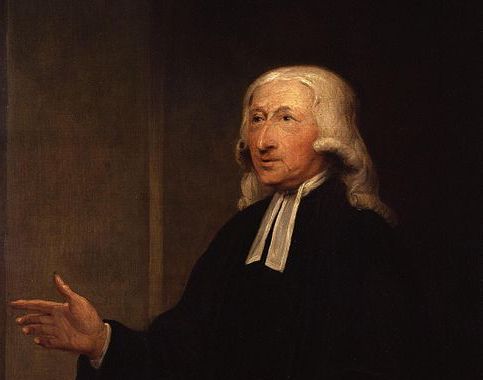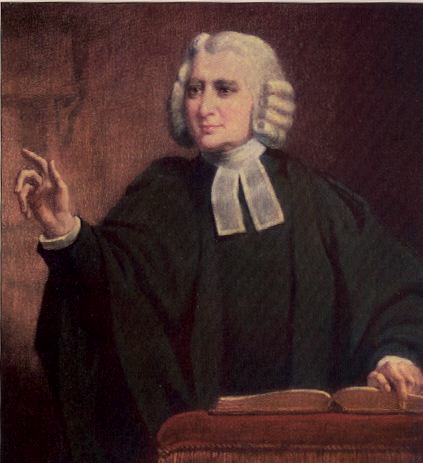This year we will likely hear (or preach ourselves) sermons on the “true meaning of Christmas.” If contemporary Protestantism holds true to form, in many cases this will mean exhortations to be kind, give of ourselves, and do unto others as we would have them do unto us. From a Wesleyan perspective, however, such interpretations of the meaning of Christmas are simply inadequate.

Altar marking the traditional spot of Christ’s birth in the Church of the Nativity, Bethlehem
If you read through Wesley’s sermons, you will soon discover that virtually every sentence has to do with the transformation of the believer made possible through the life, death, and resurrection of Jesus Christ. As he comments on the birth of Jesus in Luke, Wesley writes, “For with the Redeemer’s birth, peace and all kinds of happiness come down to dwell on earth: yea, the overflowings of divine good-will and favour are now exercised toward men” (Explanatory Notes Upon the New Testament, Luke 2:14).
The coming of Jesus Christ means peace, happiness and divine favor. Jesus is the very embodiment of these, and we receive these blessings when we are united with Christ through new birth.

It would be easy, however, to misconstrue Wesley’s theology of blessing. Today, messages about blessing often have to do with health, wealth, and prosperity. Wesley did indeed believe God could and would provide these, but he added one very significant qualification: with every blessing comes more responsibility. For their own sakes, health, wealth, and prosperity were only traps of Satan intended to lure us through the wide gate and the broad way that lead to destruction, as opposed to the “strait gate” and “narrow way” Jesus speaks of in Matthew 7:14. In and of themselves, health, wealth, and prosperity simply pave the way to hell.
As he says in his sermon, “The Use of Money,” God placed each of us here “not as a proprietor, but a steward. As such he entrusted you for a season with goods of various kinds. But the sole property of these still rests in [God], nor can ever be alienated from him” (Kenneth J. Collins and Jason E. Vickers, eds., The Sermons of John Wesley: A Collection for the Christian Journey, III.2). Therefore, whatever material blessings we receive are given to us to advance God’s work in the world. God doesn’t want just part of our lives. God wants every single moment, every penny, every breath to serve God’s righteous purposes. Thus Wesley’s “covenant prayer”:
I am no longer my own, but thine.
Put me to what thou wilt, rank me with whom thou wilt.
Put me to doing, put me to suffering.
Let me be employed for thee or laid aside for thee,
exalted for thee or brought low for thee.
Let me be full, let me be empty.
Let me have all things, let me have nothing.
I freely and heartily yield all things to thy pleasure and disposal.
And now, O glorious and blessed God, Father, Son and Holy Spirit,
thou art mine, and I am thine.
So be it.
And the covenant which I have made on earth,
let it be ratified in heaven.
Amen.
In and of ourselves, we are completely unable to dedicate our lives to God in this way. We need the power of God to serve God, and only then can we have the peace, happiness, and divine favor of which Wesley writes.
This transformation—receiving the capacity to serve God faithfully–was made possible through the Incarnation. Wesley speaks more directly of this in his notes on John 1:14:
“[I]n order to raise us to this dignity and happiness, the eternal Word, by a most amazing condescension, was made flesh, united Himself to our miserable nature, with all its innocent infirmities…. He was in Himself most benevolent and upright; made those ample discoveries of pardon to sinners which the Mosaic dispensation could not do; and really exhibited the most substantial blessings; whereas that was but ‘a shadow of good things to come’” (Collins and Vickers, italics original).
Put differently, by uniting himself with our nature in the Incarnation, Christ made available to us blessings of transformation and pardon. Here Wesley may be reading John partially through a Pauline lens, or perhaps through Hebrews, emphasizing that the law could not give us transformation or pardon, but rather pointed forward toward the blessing of Jesus Christ.
So for Wesley, the coming of Christ means that we can be changed. We no longer stand in guilt before God, and we are no longer compelled to sin by the power of original sin. We have peace, happiness, and an abundance of divine goodwill and favor. Christmas is not about being kind, giving, or loving, as important as these ways of living are. Rather, Christmas is about God’s triumph over sin and death. Only because of God’s work in Jesus Christ can we live consistently in ways that are kind, giving, and loving.

Charles Wesley expressed this in beautiful poetry in the hymn, “Hark, the Herald Angels Sing.” He wrote of “peace on earth and mercy mild, God and sinners reconciled.” The third stanza of this hymn is surely the most powerful:
Hail the heav’n-born Prince of Peace!
Hail the Son of Righteousness!
Light and life to all He brings
Ris’n with healing in His wings
Mild He lays His glory by
Born that man no more may die
Born to raise the sons of earth
Born to give them second birth
Hark! The herald angels sing
“Glory to the newborn King!



Dr. Watson, thanks for the great reflection and taking Christmas beyond mere moralism!
Thanks, Randy!
Reblogged this on Talmidimblogging.
What a great post. Merry Christmas!!!
Pingback: The True Meaning of Christmas, According to the Wesleys — David F. Watson – Rev. Rusty's Blog
A wonderful message… Glory to the newborn King!